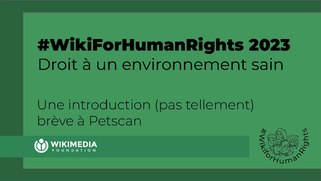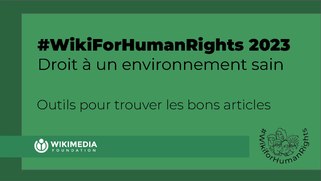WikiForHumanRights/Creating Topic Lists

To organize for this campaign, you will need to identify an appropriate topic that combines human rights themes and topics for impact, such as the Sustainable Development Goals, and potential candidate content to work on within those these.
What is a Topic for Impact?
In the Wikimedia Movement, we are focused on filling key knowledge gaps around Topics for Impact. Movement strategy describes topics for impact having two ways of evaluating:
- areas that are likely to have high impact
- areas historically left out by structures of power and privilege
Documenting topics related to human rights and the sustainable development goals combine both of these issues: ensuring that local communities have access to knowledge about global issues, while allowing Wikimedia communities to do what they do best, document local perspectives and the perspectives of marginalized communities that are often ignored in international media.
For example, the Right to Water and Sanitation can be documented at different levels:
- At the international level, you can focus on the international human right, the Sustainable Development Goal 6 focused on Clean Water, and international science about best practices for clean water and sanitation.
- At the national level, you can documenting policies, statistics, technological innovations and efforts to improve access to clean and healthy water or sanitation within your country. These national issues can be an important part of having content that responds to national or local news in context.
- At the local level, you can document relationship of humans in each city or near each water body article how the sanitation and water infrastructure works, documenting NGOs and activists involved in advocating for the human right to clean water and sanitation, and connecting the topics to local history such as water crises, protests, and political campaigns. These acts of documentation allow you to focus on the most affected people.
At each stage, the articles can reflect both the high impact topic, and focus on the communities in that context.
For organizing for #WikiForHumanRights 2024, we want you to identify "Knowledge for a sustainable future" that reflect these global priorities for sustainability, while also being relevant for your local communities.
Step 1: Pick the right topic for impact in your context
We are focused on topics that combine Human Rights and SDGs for this campaign. To pick a theme, that makes sense for your community, the partners you have and the target audience for your events, you will have to identify a topic that combines human rights and sustainable development topics that you think will be interesting in your community.
Finding a SDG + Human Rights combination that matches your needs

The first step is to identify that you and your community can organize events around, and might have gaps on Wikimedia projects your community contributes to. This involves learning more about the SDGs and their relationship to human rights. To do this, we recommend exploring this tool and finding SDGs that intersect with human rights topics.
Diagnosing local relevance
SDGs and Human Rights topics are universally impactful. However, to motivate local participants, its important to work with local partner and create opportunities for editors to contribute it helps to bring a local perspective to the topic in a way that would be appealing to the local audience. Events could be communicated within this kinds of perspective: such as "Right to water in Ghana", "Right to education in Latin America", "Rights of Women in the Phillipines" or "Swahili sustainable cities".
When picking the right topic for your events, its important to ask a few questions, and use that to evaluate the topic:
| Question | Evidence | Things to Consider |
|---|---|---|
| Does the topic enter public awareness in your context on a regular basis? |
|
Some topics are visible because they are polarizing and a source of misinformation -- these topics are hard for involved parties to write about. |
| Is it a reasonable topic to work on as volunteers? |
|
Some topics, especially in human rights, make communities vulnerable to political persecution, avoid currently polarizing topics where possible. |
| Do we need to create the topic on Wikimedia projects as part of our activity or can we start from existing content? |
|
Newcomer events should expand existing content by adding sections, translating from other languages, etc. Writing content about topics with no existing examples on-wiki is best left for experienced contributors and experts. |
| Does the topic allow us to look at sustainability solutions that are well documented? |
|
This campaign focuses on knowledge for a sustainable future. If the topic is not focused on the future, and solutions it might not be appropriate for this campaign. |
Step 2: Find examples to evaluate possible impact
The next step is finding out if the topic will actually work in your context. This requires doing two things:
- Figuring out the story you are going to tell about the event (Why it is important to your audience?)
- Figuring out if Wikipedia is a good place to share knowledge about that topic (Why Wikipedia is a good platform for that topic? -- usually we demonstrate this with pageviews on similar articles)
If you do this as an organizer, you now have two pieces of information: that the work of volunteers will have impact, and increase the impact of my Wikimedia project. Moreover, with this information, you can develop a communication strategy for the event on the the topic that I want others to work on.
An example
This is best illustrated with an example: I will use an example from Uruguay and the Right to Water and Sanitation which is part of Sustainable Development Goal 6: Clean Water and Sanitation.
Water and sanitation makes sense as a call to action in Uruguay, because there was a water crises in 2023 that brought a lot of public attention and awareness to the right to water. Moreover, local environmental conflicts on different waterways related to pollution, poor agricultural practices and problems with water quality mean its a familiar topic for many.

As for impact, I can try to figure out the pageviews of Spanish Wikipedia related to the topic. For example, by searching for three articles about the Water crises and two rivers where there are environmental conflicts, I discover that they regularly have more than 10-20 pageviews a day, especially when news events about the conflicts. This is particularly impactful for topics related to Uruguay, and I can assume that if I teach others to document rivers and water issues in Uruguay, there is a possibility that content will get read when there are future issues.
Step 3: Build your list
For every event that you organize with participants in the Wikimedia movement, its helpful to have a list of topics that you know that your participants can edit. More experienced editors may be able to select their own topics, but if you don't provide a list of possible topics to edit, many people will spend time exploring Wikipedia instead of doing the thing that you want to do in the event: edit!
You have two choices for building lists:
- Manually creating a list - which involves researching a topic and;
- Using a tool to generate a list -- which involves searching existing content on Wikimedia projects for likely topics.
Pick a tool
There are three tools commonly used in listbuilding for Wikimedia campaigns and events:
- Listbuilding -- A tool from WMF Research that uses machine learning to identify "similar" topics.
- Petscan -- a querying tool that allows you to search through categories and other features of Wikipedia articles
- Wikidata Query Service – a complex querying tool
Watch these videos and learn from these slide decks how list building tools work, and pick the one that you want to use:
-
WikiForHumanRights 2023 session on Tools for Finding the Right Articles Recording in English
-
WikiForHumanRights 2023 Capacity Building on Building Article List with Petscan
-
(English) A Brief (or not so brief) introduction to Petscan
-
(French) A Brief (or not so brief) introduction to Petscan
-
(Arabic) A Brief (or not so brief) introduction to Petscan
-
WikiForHumanRights English Slide Deck for Tools for Finding the Right Articles
-
WikiForHumanRights English Slide Deck for Tools for Finding the Right Articles
-
WikiForHumanRights English Slide Deck for Tools for Finding the Right Articles
Ask for help and Get Feedback!
If you need help at any step in the process, you can ask for help in the campaign telegram channel or via your regional coordinators or the campaigns![]() wikimedia
wikimedia![]() org
org







